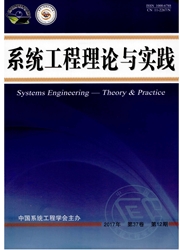

 中文摘要:
中文摘要:
考虑灰色市场条件下由一个制造商和两个分别处于不同国家的分销商构成的供应链,分别分析了完全分散化、部分分散化和集中化决策下的供应链定价策略。考察了各种决策模式下,消费者对灰市产品价值的认可程度对制造商定价策略的影响。通过比较得出分散化和部分分散化决策下的最优定价策略偏离集中化决策下的最优定价策略。并以供应链集中化决策下的利润为基准,通过引入收益共享契约针对灰色市场条件下的完全分散化和部分分散化供应链进行协调,并给出保证供应链节点企业达到帕累托改进的收益分享系数取值范围。最后通过数值分析给出了消费者对灰市产品价值的认可程度与供应链利润、灰市产品销量及收益分享系数之间的关系。
 英文摘要:
英文摘要:
For a supply chain consisting of one manufacturer and two distributors of different countries, this paper analyzes the pricing strategies of decentralized system, half-decentralized system and centralized system. We dis- cuss the effect of the valuation discount for gray market goods on manufacturer's pricing strategy under different conditions. We find that the profits of decentralized system and half-decentralized system are less than that of centralized system. Then, it designs the coordination mechanism by introducing the revenue sharing contract, and shows the interval value of revenue coefficients when all node enterprises achieve achieve Pareto-improve- ment. Finally, we conduct a numerical experiment to discuss the impact of the valuation discount for gray market goods on the profit of supply chain, the sales volume of gray market goods and the revenue-sharing coefficient.
 同期刊论文项目
同期刊论文项目
 同项目期刊论文
同项目期刊论文
 期刊信息
期刊信息
